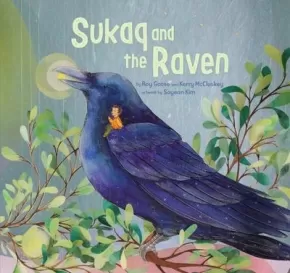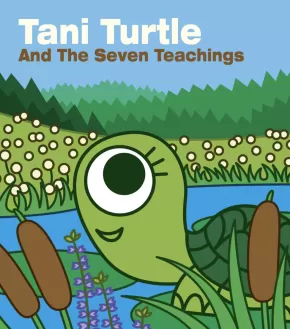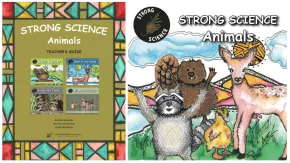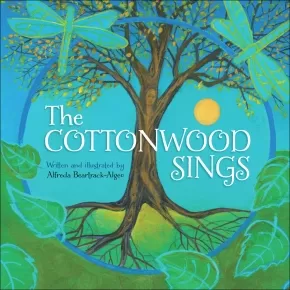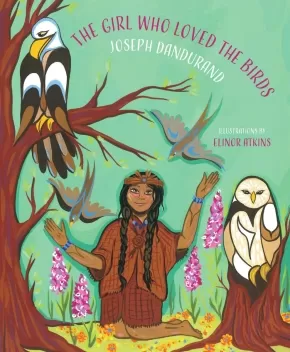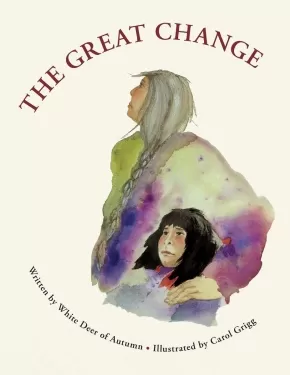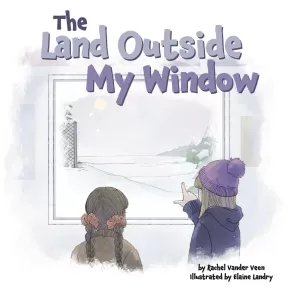
Picture Books
211
-
225
of
753 Results;
Sort By
Go To
of 51
Strong Science - Animals: Baby Beaver
 $7.50
$7.50

Artists:
Format:
Paperback
Text Content Territories:
Indigenous Canadian;
Grade Levels: Kindergarten; 1;
ISBN / Barcode: 978-1-77174-604-5
Synopsis:
Synopsis:
This book is about a baby beaver.
Beavers cut down trees.
Why do you think beavers cut down trees?
Educator & Series Information
Recommended for grade 1 students, but may also be useful in kindergarten classrooms.
Strong Science - Animals is a language-based science series for primary students featuring animals that all Canadian students will recognize. Photographs and Indigenous artwork illustrate the series. Common learning objectives in science curricula across Canada are addressed, and suggestions for extending the learning to other curriculum areas, including Indigenous cultural awareness, language arts, math, and art, are included in the teacher’s guide. The sixteen books in this series are grouped into four levels that increase in complexity, designed to accommodate students with various reading abilities within a classroom. This feature facilitates the use of this series in literacy programs along with the Strong Readers series.
Baby Beaver is an EP1 (Early Primary 1) book in the Strong Science - Animals series. Font size decreases as language complexity and word count increase across levels: EP1 books have approximately 40 words, EP2 books have approximately 60 words, EP3 books have approximately 80 words, and EP4 books have approximately 100 words.
A teacher's guide for Strong Science - Animals is available: Strong Science - Animals: Teacher's Guide
Authenticity Note: This book has received the Indigenous Text label because the author is Indigenous (Lakota) and the featured animal holds cultural significance in many Indigenous cultures. The engaging story provides factual information in an easy-to-read format for children to learn science concepts and build literacy skills. It promotes respect for animals and Mother Earth, and its illustrations communicate additional cultural information through Lakota symbolism and designs. Further cultural connections are identified in the teacher's guide. Refer to the guide to explore the book's Indigenous connections fully. It is up to readers to determine if the book will work as a stand-alone authentic Indigenous text for their purposes.
Additional Information
16 Pages | 6.5" x 5.5" | Paperback | ISBN: 978-1-77174-604-5
Strong Science - Animals: Baby Deer
 $7.50
$7.50

Artists:
Format:
Paperback
Text Content Territories:
Indigenous Canadian;
Grade Levels: Kindergarten; 1;
ISBN / Barcode: 978-1-77174-608-3
Synopsis:
Synopsis:
This book is about a baby deer.
Baby deer can swim and jump.
Have you seen a baby deer? Where was it?
Educator & Series Information
Recommended for grade 1 students, but may also be useful in kindergarten classrooms.
Strong Science - Animals is a language-based science series for primary students featuring animals that all Canadian students will recognize. Photographs and Indigenous artwork illustrate the series. Common learning objectives in science curricula across Canada are addressed, and suggestions for extending the learning to other curriculum areas, including Indigenous cultural awareness, language arts, math, and art, are included in the teacher’s guide. The sixteen books in this series are grouped into four levels that increase in complexity, designed to accommodate students with various reading abilities within a classroom. This feature facilitates the use of this series in literacy programs along with the Strong Readers series.
Baby Duck is an EP1 (Early Primary 1) book in the Strong Science - Animals series. Font size decreases as language complexity and word count increase across levels: EP1 books have approximately 40 words, EP2 books have approximately 60 words, EP3 books have approximately 80 words, and EP4 books have approximately 100 words.
A teacher's guide for Strong Science - Animals is available: Strong Science - Animals: Teacher's Guide
Authenticity Note: This book has received the Indigenous Text label because the author is Indigenous (Lakota) and the featured animal holds cultural significance in many Indigenous cultures. The engaging story provides factual information in an easy-to-read format for children to learn science concepts and build literacy skills. It promotes respect for animals and Mother Earth, and its illustrations communicate additional cultural information through Lakota symbolism and designs. Further cultural connections are identified in the teacher's guide. Refer to the guide to explore the book's Indigenous connections fully. It is up to readers to determine if the book will work as a stand-alone authentic Indigenous text for their purposes.
Additional Information
16 Pages | 6.5" x 5.5" | Paperback | ISBN: 978-1-77174-608-3
Strong Science - Animals: Baby Duck
 $7.50
$7.50

Artists:
Format:
Paperback
Text Content Territories:
Indigenous Canadian;
Grade Levels: Kindergarten; 1;
ISBN / Barcode: 978-1-77174-609-0
Synopsis:
Synopsis:
This book is about a baby duck.
Baby ducks come out of eggs.
Have you seen a baby duck? Where was it?
Educator & Series Information
Recommended for grade 1 students, but may also be useful in kindergarten classrooms.
Strong Science - Animals is a language-based science series for primary students featuring animals that all Canadian students will recognize. Photographs and Indigenous artwork illustrate the series. Common learning objectives in science curricula across Canada are addressed, and suggestions for extending the learning to other curriculum areas, including Indigenous cultural awareness, language arts, math, and art, are included in the teacher’s guide. The sixteen books in this series are grouped into four levels that increase in complexity, designed to accommodate students with various reading abilities within a classroom. This feature facilitates the use of this series in literacy programs along with the Strong Readers series.
Baby Duck is an EP1 (Early Primary 1) book in the Strong Science - Animals series. Font size decreases as language complexity and word count increase across levels: EP1 books have approximately 40 words, EP2 books have approximately 60 words, EP3 books have approximately 80 words, and EP4 books have approximately 100 words.
A teacher's guide for Strong Science - Animals is available: Strong Science - Animals: Teacher's Guide
Authenticity Note: This book has received the Indigenous Text label because the author is Indigenous (Lakota) and the featured animal holds cultural significance in many Indigenous cultures. The engaging story provides factual information in an easy-to-read format for children to learn science concepts and build literacy skills. It promotes respect for animals and Mother Earth, and its illustrations communicate additional cultural information through Lakota symbolism and designs. Further cultural connections are identified in the teacher's guide. Refer to the guide to explore the book's Indigenous connections fully. It is up to readers to determine if the book will work as a stand-alone authentic Indigenous text for their purposes.
Additional Information
16 Pages | 6.5" x 5.5" | Paperback | ISBN: 978-1-77174-609-0
Strong Science - Animals: Baby Raccoon
 $7.50
$7.50

Artists:
Format:
Paperback
Text Content Territories:
Indigenous Canadian;
Grade Levels: Kindergarten; 1;
ISBN / Barcode: 978-1-77174-605-2
Synopsis:
Synopsis:
This book is about a baby raccoon.
Raccoons can climb trees.
Why do you think raccoons climb trees?
Educator & Series Information
Recommended for grade 1 students, but may also be useful in kindergarten classrooms.
Strong Science - Animals is a language-based science series for primary students featuring animals that all Canadian students will recognize. Photographs and Indigenous artwork illustrate the series. Common learning objectives in science curricula across Canada are addressed, and suggestions for extending the learning to other curriculum areas, including Indigenous cultural awareness, language arts, math, and art, are included in the teacher’s guide. The sixteen books in this series are grouped into four levels that increase in complexity, designed to accommodate students with various reading abilities within a classroom. This feature facilitates the use of this series in literacy programs along with the Strong Readers series.
Baby Raccoon is an EP1 (Early Primary 1) book in the Strong Science - Animals series. Font size decreases as language complexity and word count increase across levels: EP1 books have approximately 40 words, EP2 books have approximately 60 words, EP3 books have approximately 80 words, and EP4 books have approximately 100 words.
A teacher's guide for Strong Science - Animals is available: Strong Science - Animals: Teacher's Guide
Authenticity Note: This book has received the Indigenous Text label because the author is Indigenous (Lakota) and the featured animal holds cultural significance in many Indigenous cultures. The engaging story provides factual information in an easy-to-read format for children to learn science concepts and build literacy skills. It promotes respect for animals and Mother Earth, and its illustrations communicate additional cultural information through Lakota symbolism and designs. Further cultural connections are identified in the teacher's guide. Refer to the guide to explore the book's Indigenous connections fully. It is up to readers to determine if the book will work as a stand-alone authentic Indigenous text for their purposes.
Additional Information
16 Pages | 6.5" x 5.5" | Paperback | ISBN: 978-1-77174-605-2
Strong Science - Animals: Deer in the Snow
 $7.50
$7.50

Artists:
Format:
Paperback
Text Content Territories:
Indigenous Canadian;
Grade Levels: Kindergarten; 1;
ISBN / Barcode: 978-1-77174-616-8
Synopsis:
Synopsis:
This story is about how deer find food when it snows.
There are four seasons in the year: winter, spring, summer, and fall. Which season is this story about?
Educator & Series Information
Recommended for grade 1 students, but may also be useful in kindergarten classrooms.
Strong Science - Animals is a language-based science series for primary students featuring animals that all Canadian students will recognize. Photographs and Indigenous artwork illustrate the series. Common learning objectives in science curricula across Canada are addressed, and suggestions for extending the learning to other curriculum areas, including Indigenous cultural awareness, language arts, math, and art, are included in the teacher’s guide. The sixteen books in this series are grouped into four levels that increase in complexity, designed to accommodate students with various reading abilities within a classroom. This feature facilitates the use of this series in literacy programs along with the Strong Readers series.
Deer in the Snow is an EP3 (Early Primary 3) book in the Strong Science - Animals series. Font size decreases as language complexity and word count increase across levels: EP1 books have approximately 40 words, EP2 books have approximately 60 words, EP3 books have approximately 80 words, and EP4 books have approximately 100 words.
A teacher's guide for Strong Science - Animals is available: Strong Science - Animals: Teacher's Guide
Authenticity Note: This book has received the Indigenous Text label because the author is Indigenous (Lakota) and the featured animal holds cultural significance in many Indigenous cultures. The engaging story provides factual information in an easy-to-read format for children to learn science concepts and build literacy skills. It promotes respect for animals and Mother Earth, and its illustrations communicate additional cultural information through Lakota symbolism and designs. Further cultural connections are identified in the teacher's guide. Refer to the guide to explore the book's Indigenous connections fully. It is up to readers to determine if the book will work as a stand-alone authentic Indigenous text for their purposes.
Additional Information
16 Pages | 6.5" x 5.5" | Paperback | ISBN: 978-1-77174-616-8
Strong Science - Animals: Mother and Baby Raccoons
 $7.50
$7.50

Artists:
Format:
Paperback
Text Content Territories:
Indigenous Canadian;
Grade Levels: Kindergarten; 1;
ISBN / Barcode: 978-1-77174-613-7
Synopsis:
Synopsis:
This story is about the home mother raccoon makes in a tree for her babies. The home is called a den.
There are four seasons in the year: winter, spring, summer, and fall. Which season is this story about?
Educator & Series Information
Recommended for grade 1 students, but may also be useful in kindergarten classrooms.
Strong Science - Animals is a language-based science series for primary students featuring animals that all Canadian students will recognize. Photographs and Indigenous artwork illustrate the series. Common learning objectives in science curricula across Canada are addressed, and suggestions for extending the learning to other curriculum areas, including Indigenous cultural awareness, language arts, math, and art, are included in the teacher’s guide. The sixteen books in this series are grouped into four levels that increase in complexity, designed to accommodate students with various reading abilities within a classroom. This feature facilitates the use of this series in literacy programs along with the Strong Readers series.
Mother and Baby Raccoons is an EP3 (Early Primary 3) book in the Strong Science - Animals series. Font size decreases as language complexity and word count increase across levels: EP1 books have approximately 40 words, EP2 books have approximately 60 words, EP3 books have approximately 80 words, and EP4 books have approximately 100 words.
A teacher's guide for Strong Science - Animals is available: Strong Science - Animals: Teacher's Guide
Authenticity Note: This book has received the Indigenous Text label because the author is Indigenous (Lakota) and the featured animal holds cultural significance in many Indigenous cultures. The engaging story provides factual information in an easy-to-read format for children to learn science concepts and build literacy skills. It promotes respect for animals and Mother Earth, and its illustrations communicate additional cultural information through Lakota symbolism and designs. Further cultural connections are identified in the teacher's guide. Refer to the guide to explore the book's Indigenous connections fully. It is up to readers to determine if the book will work as a stand-alone authentic Indigenous text for their purposes.
Additional Information
16 Pages | 6.5" x 5.5" | Paperback | ISBN: 978-1-77174-613-7
Sukaq and the Raven (PB)
$13.95
Artists:
Format:
Paperback
Text Content Territories:
Indigenous Canadian; Inuit;
ISBN / Barcode: 9781772274349
Synopsis:
Synopsis:
Sukaq loves to drift off to sleep listening to his mother tell him stories. His favourite story is the tale of how a raven created the world. But this time, as his mother begins to tell the story and his eyelids become heavy, he is suddenly whisked away on the wings of the raven to ride along as the entire world is formed! This traditional legend from Inuit storyteller Roy Goose is brought to life through co-author Kerry McCluskey's jubilant retelling.
Additional Information
36 pages | 9.25" x 9.25" | Paperback
Suupi and the Sun Celebration
$14.95
Artists:
Format:
Paperback
Text Content Territories:
Indigenous Canadian; Inuit;
Grade Levels: Preschool; Kindergarten;
ISBN / Barcode: 9781774506943
Synopsis:
Synopsis:
Join in on the Sun Celebration in Grise Fiord, Nunavut, in this charming bilingual storybook!
Suupi lives in Grise Fiord, Nunavut. After three months of darkness in her community, the sun is finally about to return. Suupi and her friends can’t focus on their schoolwork. Today they will celebrate the return of the sun! There will be a sliding competition, a school performance, and a community feast. But Suupi is nervous about performing with her class in front of so many people. Will she find a way to overcome her fear?
Written by an author from Grise Fiord, a community in Nunavut where the sun doesn’t rise for nine months, Suupi and the Sun Celebration introduces readers to traditions within this Northern community that commemorate the return of the sun each year.
Educator & Series Information
Recommended for ages 3 to 5.
Bilingual Inuktitut and English Edition
Themes: Family, Community, Return of the Sun, Celebrations, Singing, Traditional Songs, Throat Singing, Sun Celebration
This book is part of the Community Connections series.
Additional Information
44 pages | 8.00" x 8.00". Paperback
Tani Turtle and The Seven Teachings
$9.99
Artists:
Format:
Paperback
Text Content Territories:
Indigenous Canadian; First Nations; Anishinaabeg; Ojibway;
ISBN / Barcode: 9781990297663
Synopsis:
Synopsis:
Tani Turtle and The Seven Teachings is a story about Truth. Let’s learn the Seven Teachings! Each story has simple and repetitive words. These Early Learner stories are for young children.
Educator & Series Information
Early Learner story. The publisher recommends this title for kindergarten to grade 4.
This book is part of The Seven Teaching series.
Additional Information
Paperback
Teacher Resource Bundle: Strong Science - Animals
 $135.00 $150.00
$135.00 $150.00

Text Content Territories:
Indigenous Canadian; First Nations; Sioux; Lakota; Hunkpapa;
Grade Levels: Kindergarten; 1;
ISBN / Barcode: 9781771746663
Synopsis:
Synopsis:
This bundle includes one copy of each of the 16 Strong Science - Animals titles and the accompanying Strong Science: Animals - Teacher's Guide.
About the Strong Science - Animals Series
Strong Science - Animals is a language-based science series for primary students featuring animals that all Canadian students will recognize. Photographs and Indigenous artwork illustrate the series. Common learning objectives in science curricula across Canada are addressed, and suggestions for extending the learning to other curriculum areas, including Indigenous cultural awareness, language arts, math, and art, are included in the teacher’s guide. The sixteen books in this series are grouped into four levels that increase in complexity, designed to accommodate students with various reading abilities within a classroom. This feature facilitates the use of this series in literacy programs along with the Strong Readers series.
Books in this series are divided into four levels: Early Primary 1 (EP1); Early Primary 2 (EP2); Early Primary 3 (EP3); Early Primary 4 (EP4). Font size decreases as language complexity and word count increase across levels: EP1 books have approximately 40 words, EP2 books have approximately 60 words, EP3 books have approximately 80 words, and EP4 books have approximately 100 words.
Each book is 16 pages, 6.5" x 5.5", and paperback
About the Strong Science - Animals: Teacher's Guide
This teacher’s guide supports a language-based Science unit for early primary classrooms, using the sixteen titles in Strong Nations Publishing’s Strong Science - Animals series.
The unit introduces early primary students to four easily recognizable animals that live in or near many communities in Canada: beaver, black-tailed deer, mallard duck, and raccoon. While learning about the animals, students will gain knowledge and skills mandated by Ministry of Education Science curricula in Canadian provinces and territories.
In addition, this teacher’s guide addresses other curriculum areas— Language Arts, Math, Social Studies, and Art—and provides information to help develop an appreciation for and understanding of Indigenous cultures.
This teacher-friendly, comprehensive teacher’s guide provides:
• lesson plans to introduce the books in the Strong Science - Animals series;
• lesson plans to address knowledge and skills common to Canadian Science curricula;
• activities to integrate the unit across the curriculum;
• activities to wrap up the unit
The teacher's guide is 170 Pages, 8.5" x 11", and coil bound
Additional Information
Teacher Resource Bundle ISBN: 9781771746663
The Cottonwood Sings
$18.95
Format:
Paperback
Text Content Territories:
Indigenous American; Native American; Sioux; Lakota;
ISBN / Barcode: 9780966931716
Synopsis:
Synopsis:
The Cottonwood Sings is the delightful story of the lovely Hunku (First Woman), who was immortal and never aged. The animals and plants loved her, but Hunku was lonely. Every day she would go to the riverbank and cry herself to sleep. Beaver, who lived in the river, fell in love with the beautiful Hunku and begged the Great Spirit to turn him into a man. The Great Spirit agreed, and Beaver became Takahe (First Man), but the Great Spirit told him that one day he would have to go back to being Beaver. Hunku and Takahe enjoyed their life together, and they had four beautiful daughters.
The day finally came when Beaver had to return to the river. Hunku missed her companion and asked the Great Spirit to turn her into a tree so she could always be close to Beaver. The Great Spirit agreed to her request, and to this day you will find cottonwood trees living near bodies of water and beavers living near cottonwood trees.
Educator Information
Recommended for grades 2 and under.
In this story, the four daughters marry the four songs of Tate, the Spirit of the Wind. Each couple journeys to one of the four directions to form a sacred medicine wheel.
Themes / Keywords: First Woman, First Man, Medicine Wheel, Cottonwood, Beaver, Traditional Stories, Indigenous Picture Books,
Additional Information
40 pages | 8.50" x 8.50" | Paperback
The Girl Who Loved the Birds
$15.95
Artists:
Format:
Paperback
Text Content Territories:
Indigenous Canadian; First Nations; Salish; Coast Salish; Sto:lo; Kwantlen;
ISBN / Barcode: 9780889714441
Synopsis:
Synopsis:
A story for children by Kwantlen storyteller and award-winning poet Joseph Dandurand.
The Girl Who Loved the Birds is the third in a series of Kwantlen legends by award-winning author Joseph Dandurand, following The Sasquatch, the Fire and the Cedar Baskets and A Magical Sturgeon.
Accompanied by beautiful watercolour illustrations by Kwantlen artist Elinor Atkins, this tender children’s story follows a young Kwantlen girl who shares her life with the birds of the island she calls home. Collecting piles of sticks and moss for the builders of nests, sharing meals with the eagles and owls, the girl forms a lifelong bond with her feathered friends, and soon they begin to return her kindness.
Written with Dandurand’s familiar simplicity and grace, The Girl Who Loved the Birds is a striking story of kinship and connection.
Educator & Series Information
Recommended for ages 6 to 8.
The Girl Who Loved the Birds is the third in a series of Kwantlen legends, the Kwantlen Stories Then and Now series, by award-winning author Joseph Dandurand, following The Sasquatch, the Fire and the Cedar Baskets and A Magical Sturgeon.
Additional Information
24 pages | 7.00" x 8.50" | Paperback
The Great Change
$14.99
Artists:
Format:
Paperback
Text Content Territories:
Indigenous American; Native American;
ISBN / Barcode: 9781582708928
Synopsis:
Synopsis:
What happens when we die? In this beautifully illustrated Native American tale, a wise grandmother explains their people's understanding of death to her granddaughter as they work together on the land, for which they show an exemplary respect and love.
In this Native American tale, a wise grandmother explains the meaning of death, or the Great Change, to her questioning granddaughter. While going through their daily tasks in the Native way, taking from Mother Earth only what is needed and returning what is not used so as to replenish her, nine-year-old Wanba asks, “Why do fish have to die? Why does anything have to die? Why did Grandpa have to die?” Grandmother explains that just as a caterpillar “dies” only to become a beautiful butterfly, there is no “death” in the Circle of Life—only the Great Change.
This is a story of passing on tradition, culture, and wisdom to the next generation. It is a moving tale for everyone—child and adult—who wonders about what lies beyond this life.
Reviews
A gentle and sensitive story about mortality and the interconnectedness of generations and of life-forms that provides a nondoctrinal, reassuring response to a child's questions about the necessity of death. Grigg's watercolors are spare, with washes of brilliant color (cheering a potentially somber subject) against pure white pages. The characters are not romanticized, but the overall effect is delicate and impressionistic." —Patricia Dooley, University of Washington, Seattle Grades 3–6, School Library Journal
This wistful text, based on a Native American tale, ponders the meaning of life and death—reaching the sensible if daunting conclusion that one is impossible without the other.…Delicate pastel watercolors capture the story's essence on gossamer wings with a pleasing combination of sophistication and childish impressibility. —Publisher's Weekly
Educator Information
Recommended for ages 6 to 12.
Additional Information
32 pages | 8.50" x 11.00" | Paperback
The Great Giants of the Arctic
$22.95
Artists:
Format:
Hardcover
Text Content Territories:
Indigenous Canadian; Inuit;
ISBN / Barcode: 9781774506608
Synopsis:
Synopsis:
“Long ago, there lived great giants in the Arctic.”
But where did they go? Learn all about the famous giants of the North, including Inukpasuksuk, Nuvuja, and others. Why do winds from the south bring warm weather? What happens when the giant in the sky gets upset? The Great Giants of the Arctic answers these questions and more using simple language for young readers to enjoy.
This stunningly illustrated bilingual picture book serves as an early-level introduction to the rich, mysterious world of Inuit mythology. Adapted by author and linguist Jaypeetee Arnakak with the intention of teaching Inuktitut as as a second language, The Great Giants of the Arctic can be enjoyed by Inuktitut language learners and curious young readers alike.
Educator Information
Recommended for ages 3 to 6.
Bilingual: Inuktitut and English
Additional Information
36 pages | 8.50" x 8.50"| Hardcover
The Land Outside My Window
$15.00
Artists:
Format:
Paperback
Text Content Territories:
Indigenous Canadian; First Nations; Dene; Yellowknives Dene (T'atsaot'ine);
ISBN / Barcode: 9781738119608
Synopsis:
Synopsis:
A young child stares out her window at spaces and places she has not had access to in the past, but that was about to change. Her teacher leads her to the Land, and through several children’s eyes, we see all that the Land can teach us.
Each place carries stories. The child wonders and poses many questions about the Land and the past as she wanders and plays with her friend discovering and learning together.
Educator Information
The author recommends this book for grades 3+.
Includes an Author's Note.
The Land Outside My Window was inspired by the work of many people across the Northwest Territories who envisioned on-the-Land programming as a possibility for all. Mahsi Cho for your vision and dedication.
Additional Information
30 pages
Sort By
Go To
of 51









